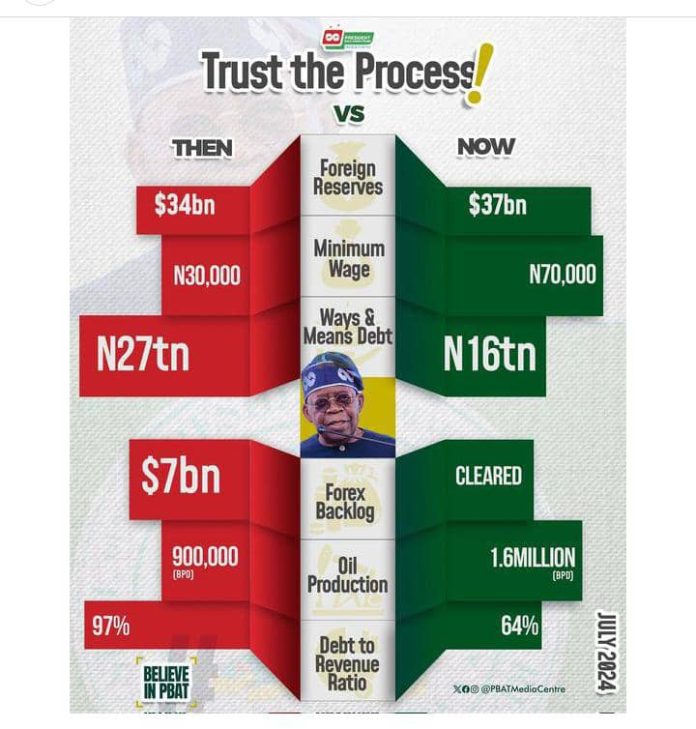A senior colleague (and one of the strong supporters of President Tinubu) in one of the WhatsApp groups I’m in shared the above metrics (in this post’s featured image) as the important accomplishments that President Tinubu has achieved so far in just one year in office.
While I agree that there has been some improvement in Nigeria between 2023 and 2024 since he took over the federal government, I do not agree that the following are important metrics.
- Increase in minimum wage from ₦30,000 to ₦70,000: This is a substantial increase, but we should remember that when the minimum wage was ₦30,000, a bag of rice was ₦18,000, so families could still afford it. But now that the minimum wage is ₦70,000, a bag of rice is ₦75,000.
- Increase in crude oil production from 900,000 barrels per day (BPD) to 1,600,000 BPD:** Increasing BPD while the organization in charge isn’t publicly audited or transparent isn’t okay.
- As regards the increase in foreign reserves and decrease in the debt-to-revenue ratio, and ways and means debt, these are quite good, but I really don’t know how to verify that the figures are correct.
Anyway, I understand that change takes time and the government can’t solve all our problems. In fact, they can only try to improve things, and most times, they don’t achieve much due to powers and challenges they’re not prepared to handle.
Nevertheless, here are important metrics that Nigerians should focus on or talk about. I believe they really matter.
1. Central bank printing of excessive Naira due to increasing government expenditure.
2. Excessive borrowing due to increasing government expenditure.
3. Misappropriation of funds from our major revenue source (crude oil): If the Nigerian National Petroleum Commission(NNPC) is broke or running at a deficit despite being the institution earning the highest revenue, what is expected of other institutions, bodies, and individuals?
4. Debt servicing with 80%+ of our monthly revenue/income: It’s like a family man using 80% of his salary to pay debt. How will he survive next month? Of course, by borrowing more. And the cycle continues.
5. Low production output and investment in agriculture, mainly due to security and corruption: I’m even ashamed of myself here because I’m also primarily a consumer. I tried producing farm produce but didn’t succeed, so I’m just marketing them for now.
6. Over-reliance on federal government (FG) revenues: Most economic activities rely on the income/revenue and salary paid by the FG. Such an economy is going nowhere. The same FG is even broke and has refused to cut its expenditures. Instead, it’s borrowing more.
7. Reduction in foreign direct investments due to political and economic instability: Most of these foreign companies are even leaving.
8. Rising inflation relative to income/wages: Although this is also occurring in Europe, ours is just worse because our minimum monthly wage can’t even buy a bag of rice that will feed a family for a month, let alone cover transportation, medicine, etc.
9. Devaluation of the currency and other backward economic policies recommended by the IMF/World Bank when our government seeks loans: This makes things more expensive for locals and cheaper for foreigners (making locals poorer while enriching foreigners).
10. And many more: Some of my friends said BVAS and uploading election results online also matter. As regards corruption, while it’s important, we need to start by tackling the corruption within our daily lives and businesses, then look at tackling corruption at the higher level (clean your backyard first).
Nevertheless, we all know that this current system benefits some people, so we can either complain or look for legal ways to improve our lives if things aren’t changing for the better anytime soon.
But what do I know? Nothing per se.
I just know I’m not being paid to write this or support/share metrics that don’t really matter, or tell people not to engage in peaceful protests.
Also, the federal government of Nigeria has to reduce excessive/superfluous expenditure and adopt some of the measures Argentina and El Salvador have taken to revive their respective economies.
I look forward to your honest opinion and critics in the comments below.
I do not know everything, and I look forward to always getting educated and clearing my blind spot.
What am I missing?
Discover more from 9jacashflow.com
Subscribe to get the latest posts sent to your email.






